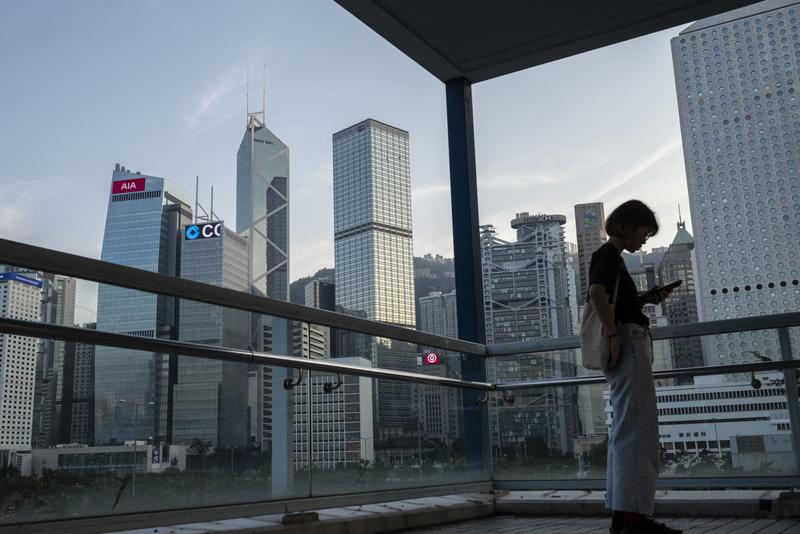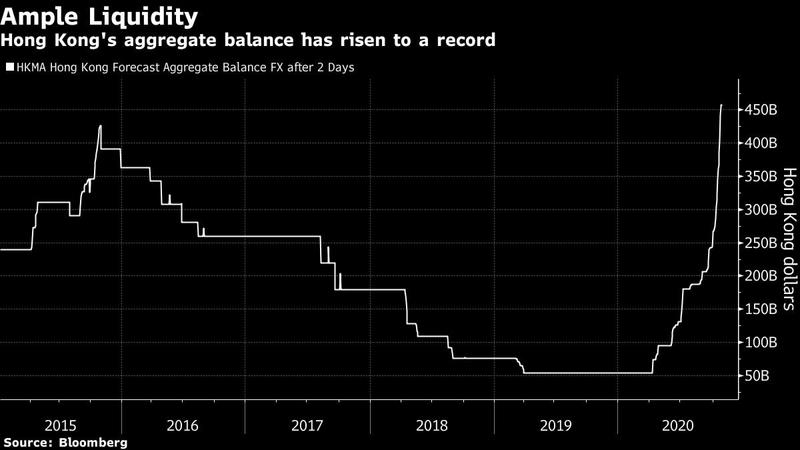 A pedestrian using a smartphone is silhouetted as commercial buildings stand in the background in the Central district of Hong Kong, on Nov 3, 2019. (CHEN LONG HEI/BLOOMBER)
A pedestrian using a smartphone is silhouetted as commercial buildings stand in the background in the Central district of Hong Kong, on Nov 3, 2019. (CHEN LONG HEI/BLOOMBER)
The Hong Kong Monetary Authority is expected to sell extra debt to soak up liquidity as funds return to the financial system following Ant Group Co’s initial public offering.
READ MORE: Hong Kong index has just made it easy for Ant to be included
Heated demand for the share sale had kept the local currency at the strong end of its trading band with the greenback in recent weeks. That spurred the HKMA to inject nearly US$24.6 billion into the financial system last month through buying US dollars, swelling the liquidity pool.
The sale of Exchange Fund Bills is one method the HKMA can use to influence the amount of liquidity in the system. Outstanding Exchange Fund Bills stood at HK$1.07 trillion (US$138 billion) as of end-September.
Liquidity conditions that are excessively flush can prompt investors to take on too many risks when buying properties and stocks, a scenario that will make the authorities worried.
Carie Li, economist at OCBC Wing Hang Bank
While excess liquidity is not a problem in most parts of the world right now, Hong Kong’s open capital borders and pegged currency make it vulnerable to fund flows in and out of the city. The retail portion of Ant’s deal lured HK$1.3 trillion in orders as of Friday, or more than 390 times the initial supply, according to the South China Morning Post, which cited people familiar with the matter.
“Liquidity conditions that are excessively flush can prompt investors to take on too many risks when buying properties and stocks, a scenario that will make the authorities worried,” said Carie Li, an economist at OCBC Wing Hang Bank. “Therefore, they may need to sell EFBs to withdraw some liquidity after the Ant IPO. And demand for the bills will be strong, given banks will want to make use of the abundant liquidity they own.”
The HKMA already planned to sell about HK$829 billion of the bills this quarter, a lot of which would be used to roll over maturing debt, according to Bloomberg calculations based on its tentative issuance schedule released in August. On top of the quarterly releases, the HKMA occasionally publishes statements on additional debt sale or reduction of planned issuance to manage liquidity.
“The HKMA will look at a range of factors, including market demand for Exchange Fund Bills, to assess the need for adjusting the issuance size,” it said in an emailed response to Bloomberg. “Hong Kong’s money markets continue to operate in an orderly manner.”

The HKMA may sell Exchange Fund Bills in small sizes, so interbank borrowing costs or the Hong Kong dollar won’t likely see outsized volatility, according to Chun Him Cheung, a strategist at Bank of America Merrill Lynch. The one-month interbank lending rate, known as Hibor, has fallen below 0.3 percent from 2.67 percent at the end of 2019. It’s at the lowest level since August.
ALSO READ: Hong Kong dollar drops most since June after Ant closes books
“Hong Kong faces high financial risks, as some tech companies are doing very well when the economy is in recession,” said Tommy Ong, managing director for treasury and markets at DBS Hong Kong Ltd. “So the HKMA will be pressured to withdraw liquidity, as it doesn’t want to see the equities bubble enlarge any further. The HKMA will likely sell EFBs in a gradual manner, with the first batch of issuance being around HK$400 billion.”
Pressure on the Hong Kong dollar to rise is ebbing now that Ant’s IPO is allocated. It weakened as much as 0.02 percent to 7.7518 versus the greenback on Tuesday and last traded at 7.7504. It has hovered at or around the 7.75 limit since mid-September.
The fact that the city’s currency has moved away from the strong end of its trading band means the window is open for the officials to absorb some of the liquidity, said OCBC’s Li. The HKMA will likely start selling Exchange Fund Bills two to three weeks after the US election, Ong said.


